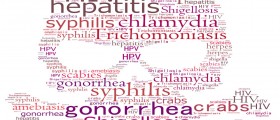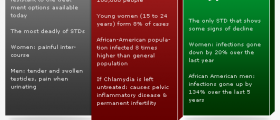
Gonorrhea is an easily contracted sexually transmitted disease. It affects both genders and is caused by the bacterium Neisseria gonorhhoeae.
In men the bacterium most commonly leads to urethritis while in women it inhabits the urethra or cervix (sometimes even both). Apart from these common infection sites, the infection also develops on other parts of the genitourinary tract. Additionally, there may be gonococcal infection of the anus, rectum and throat. The bacterium can also be the source of gonococcal infection of the eyes in newborns who have contracted the bacterium while passing through the infected mother's birth canal.
This infection is easily treated with several potent antibiotics. If treatment does not start on time or the condition remains untreated, one may end up with certain complications. Inadequately treated gonorrhea in women is a common cause of pelvic inflammatory disease and subsequent infertility or ectopic pregnancy while in men untreated infection may be a risk factor for bladder cancer.
Taking into consideration all the mentioned it is essential to know the ways of preventing the infection and if it is present to know how to recognize it and seek medical attention.
Gonorrhea Symptoms and Signs
Some cases of gonorrhea are asymptomatic. This allows the infection to be spread easily, particularly in people who practice unprotected sex and those who frequently change their partners.
If there are symptoms and signs of the infection, these usually include pain while urinating (urethral infection), itching and bleeding from the anus and rectum (rectal infection) and abnormal discharge either from the urethra or the anus (depending on the site of the infection).
The symptoms and signs of the infection are more prominent in women. They are sometimes mistaken for bladder or even vaginal infection. If the infection is not confirmed and further treated, once it affects the pelvic organs it becomes a source of lower belly pain, pain during sexual intercourse, vaginal bleeding and sometimes fever.Gonorrhea Prevention
There are rather simple measures which efficiently prevent gonorrhea and other sexually transmitted diseases.
The best means of protection is practicing safe sex. It is good to discuss STDs with a partner prior to starting a sexual relationship. This way people get to know more about STD their partners have had or may be currently suffering from. Conversation may also confirm the risk of STDs in some individuals. Even if there are no clear signs of acute infection, this does not mean that a person does not have a sexually transmitted disease.
If there are symptoms suspicious on STD or a person is being treated for STD, sexual contact should be avoided. Additionally, one should avoid sexual contact with a person who is likely to have STD or has been in an incubation period. The risk also increases if one frequently changes sexual partners. This does not mean that a person with only one partner is completely safe.
So, if one is not sure what to do, the best way of preventing the disease (if there is no chance for one to remain abstinent) is to use a condom. Condoms are highly efficient when it comes to certain STDs like gonorrhea, chlamydia and HIV. It is essential to use condoms each time one starts a new sexual relationship until both partners are confirmed they are completely healthy.

















Your thoughts on this
Loading...